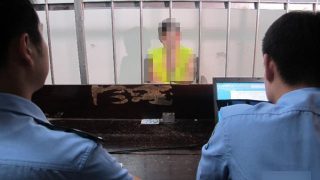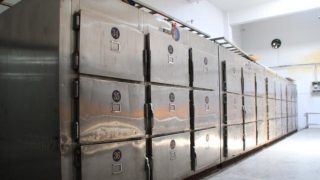Sentenced to serve time in China’s prisons, dissidents and people of faith are denied treatment, left to die. Even severely ill are forced to manual labor.
By An Xin


Incidents of gravely ill prisoners of conscience dying in detention, deprived of medical care and denied medical parole, are a frequent occurrence in China. Human rights activist Cao Shunli, who exposed the CCP’s corruption, was suffering from several diseases but still didn’t receive treatment, despite her relatives’ repeated pleas for medical parole, until she had fallen into a coma. She died a few days after she was finally sent to the hospital.
Nobel laureate Liu Xiaobo was diagnosed with advanced liver cancer while in prison. He died just one month after medical parole was granted to him. Tibetan environmental activist Tenzin Choedak was released when he was extremely frail and died two days later. Repeated applications for medical parole made by the lawyer of dissident writer Yang Tongyan (who wrote under the pen name Yang Tianshui) were denied. He died of illness just three months after released on medical parole. Human rights activists Huang Qi and Yao Wentian, who remain imprisoned, are both severely ill. Their families have made repeated applications for medical parole but to no avail.
Chinese lawyer Jiang Tianyong was released but was still restricted to seek medical care. In an interview with Radio Free Asia, Chinese human rights lawyer Tan Yongpei surmised that the reason the regime strictly controls Jiang Tianyong and doesn’t allow him to get medical treatment is that it wants to get rid of him and cover up the torture and persecution to which he had been subjected.
Chin Jin, the president of the Federation for a Democratic China, a Canada-based political group, said that even if such political figures and activists aren’t sentenced to death, the CCP still finds ways to make them disappear.
According to the white paper New Progress in the Judicial Protection of Human Rights in China, issued by the State Council Information Office in September 2016, prisons and detention centers “create medical records for detainees, are staffed with stationed doctors who make rounds of the cells every day, and promptly send detainees who need to leave the prison or detention center for medical attention to a local hospital for treatment.”
But it is apparent that for prisoners of conscience, including people sentenced for their religious beliefs, these rights are not accessible in Communist China.
Severely ill believer denied treatment
Zhao Mingqing (pseudonym) is a member of The Church of Almighty God (CAG), the largest Chinese Christian new religious movement, which has been subjected to brutal crackdowns ever since its establishment in 1991. In 2017, he was arrested and detained because of his faith. After a year in detention the man began to feel unwell: his feet became swollen, and he had weakness in his limbs. His repeated requests for medical care were rejected.
Eventually, Zhao Mingqing managed to get medical attention; and when his test results came back, the diagnosis was brutal – hepatic cirrhosis. The doctor said that his condition was extremely grave, and he must be hospitalized for treatment or face complications. But detention center personnel only let the doctor prescribe him some pills for his liver before escorting him back to his cell.
Despite Zhao Mingqing’s severe illness, he was sentenced to two years in prison for “organizing and using a xie jiao organization to undermine law enforcement.”
For patients with hepatic cirrhosis, overworking can easily exacerbate their condition, but Zhao Mingqing was still forced to work for up to 12 hours a day. He was also required to undergo three hours of mandatory military training every day. If he couldn’t recite the prison regulations, he would be forced to stand for two hours as punishment. He had to take cold showers in the frigid winter months and was forced to eat leftovers. He was barely able to carry on, constantly suffering weakness in his legs, feeling dizzy, and having breathing difficulties.
Regardless, the only treatment he received was four liver tablets per day.
The lack of effective treatment, combined with high-intensity manual labor, caused a rapid deterioration of his condition until he was barely able to walk. When once his temperature spiked to 40 degrees Celsius (104 Fahrenheit), the doctor gave him a dose of intravenous herbal mixture, after which he was forced to go back to work a 12-hour shift.
Three months later, he developed ascites – the abnormal buildup of fluid in the abdomen. Under the law, prisoners suffering from this condition are eligible for medical parole. But Zhao Mingqing was once again treated with an herbal mixture and was sent back to the workshop; his workload has not been reduced.
When he had only two months left in prison, the doctor told him that his illness had reached an advanced stage and couldn’t be cured. To ensure that he didn’t die in detention, the prison administration allowed him to stay in the prison hospital for treatment until his release.
Since the optimal time for treatment has been missed, his condition continued to deteriorate, and his ascitic fluid couldn’t be discharged; he was weak and had breathing difficulties. Even so, his medical parole application was still rejected because his condition “hadn’t reached the point of death.”
He was not released until he completed his sentence.
Throughout this time, the CAG believer was repeatedly pressured to sign a statement renouncing his faith.
Dead because of refused medical care
In 2014, Liu Shijin, a CAG member from Xinyang city in the central province of Henan, was sentenced to three years in prison for his faith. The prison was notified that Liu Shijin was gravely ill, but he was refused treatment, and his condition was deteriorating. Liu Shijin was released ahead of time, in June 2016, because of the severity of his illness. By then, Liu Shijin was unable to eat or drink anything without vomiting. He was diagnosed with stomach cancer, but because the time for treatment has passed while he was in prison, any attempts to save him proved ineffective. He died at the age of 71, four months after he was released.
Zheng Kunchang, from the southern province of Guangdong, was also sentenced to three years for membership in the CAG. He developed a severe bowel obstruction while in prison, but he was not treated, and his condition deteriorated. After his family found out about his health problems, they applied for medical parole, but were rejected because CAG believers are “special prisoners,” the prison claimed. Zheng Kunchang was eventually granted medical parole in May 2017, but due to the severity of his condition, many hospitals refused to admit him. He died in April 2018, right before his 35th birthday.
In 2004, Tang Yongjun, a CAG member from Bazhong city in the southwestern province of Sichuan, was sentenced to five years in prison. In March 2006, he died of illness while in detention, never receiving treatment, despite repeated applications for medical care. He was only 30 years old.









